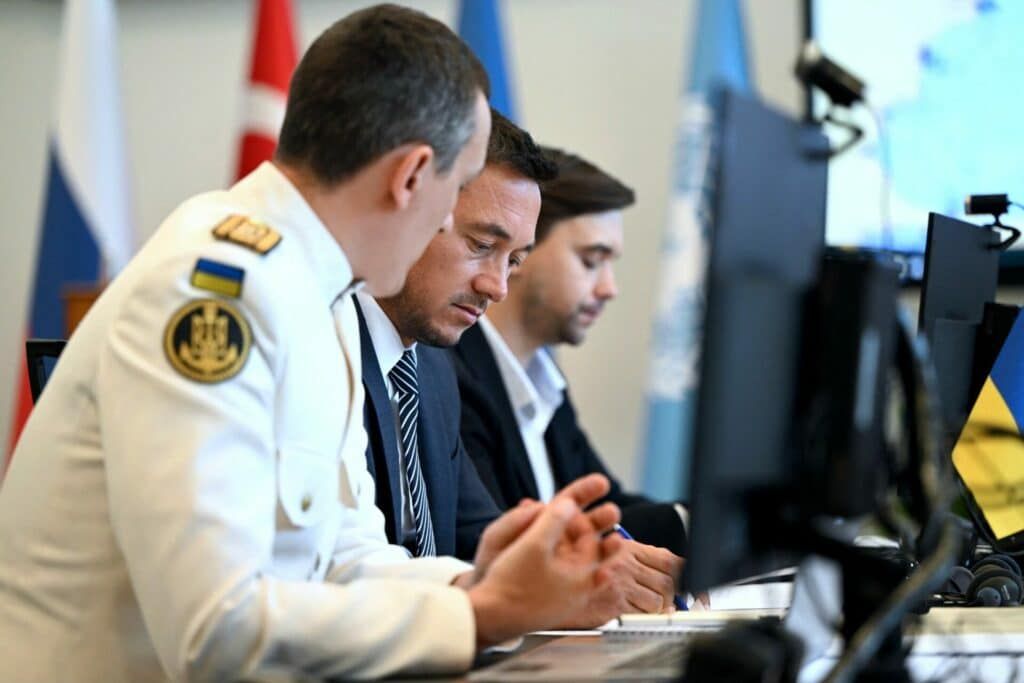War and peace: imagining a way from one to the other in Ukraine
By Aleksandr S. Kolbin | September 28, 2022
 Ukrainian officials attend the opening of the Joint Coordination Centre (JCC) for Ukrainian grain exports in Istanbul. - Turkey formally opened a joint coordination centre for Ukrainian grain exports under a UN-backed deal aimed at resuming shipments for the first time since Russia's February invasion of its neighbor. (Photo by OZAN KOSE/AFP via Getty Images)
Ukrainian officials attend the opening of the Joint Coordination Centre (JCC) for Ukrainian grain exports in Istanbul. - Turkey formally opened a joint coordination centre for Ukrainian grain exports under a UN-backed deal aimed at resuming shipments for the first time since Russia's February invasion of its neighbor. (Photo by OZAN KOSE/AFP via Getty Images)
Seven months after Russia first invaded Ukraine, I understand that there is nothing more banal than war. The fighting parties have learned new routines of war. In conjunction with the deal that allows Ukrainian grain to be exported, they coordinate war and agricultural trade at the Joint Coordination Center in Istanbul and similarly coordinate war and energy at the Sudzha gas metering station at the Russia-Ukraine border. They invite the International Atomic Energy Agency to monitor the safety of the nuclear power plant, even though it remains under regular artillery fire that both sides blame on one another. They both have long been accustomed to the fact that one of the oldest NATO members, while supplying game-changing Bayraktar combat drones to Ukraine, offers itself as the most active mediator for peace negotiations and as an important trade partner to Russia.
The routinization of war gradually turns the impossible into the ordinary, perpetuates narrow-mindedness, and ultimately postpones peace for months and years. So perhaps it is fair to put forward the following as a description of the current state of affairs: “The longer the war continues, the further the prospect of peace.” Unfortunately, realistic proposals for how the conflict can be ended are almost nonexistent, and attempts by doves to coo the way toward peace are met with accusations of betrayal or, at least, naivete, by hawks on both sides.
Nothing is more valuable, humane, and wise than peace among nations. But, unfortunately, this axiom is as bland as the war, and one that seems to have been wholly forgotten today. Clamped between two walls of ultimatums—one that says “we will get it back” and the other that “we will liberate it”—the parties to the war walk a narrowing corridor of escalation, no longer wanting to look back to where they’ve been and having almost stopped looking around at better options. The latest Russian move—to declare a partial military mobilization, organize referendums in already occupied regions, and threaten to use nuclear weapons while insisting the threat is “not a bluff”—only confirm that sad trend.
Those who say that no practical alternative to war has yet been proposed are probably right. Both sides now want victory, not compromise. Elites and societies on both sides are confident victory will be achieved (according to all the latest polls). Realizing that this impasse exists, however, should only motivate peace-seeking minds to help get out of it.
So let’s imagine for the few minutes it will take to read the text below that the parties to the war in Ukraine declared a ceasefire in the situation “as is” and ended up at the negotiating table (which is what most of the “mediators” propose) in Istanbul, Almaty, Minsk, or even in Portsmouth. What conditions or at least hypotheses should be set before their eyes to persuade them not to spit at one another at the first meeting, but to talk constructively?
Probably, we need to start by dividing the papers on the discussion table into four baskets: humanitarian issues (prisoner exchange, the fate of refugees, etc.); economic security issues (trade security and infrastructure restoration); military security issues (how in a post-conflict settlement to satisfy the military security interests of both sides and third countries); and territorial issues. Of course, the last basket will be the most difficult to discuss, but the first three sets of papers can be drafted, read, edited, and discussed right now. Moreover, some of these issues are already part of the meagre dialogue between the two belligerents.
Humanitarian issues, for instance, are discussed regularly even today, leading to real exchanges of prisoners and the bodies of dead soldiers. Other humanitarian issues may include the exchange of information about refugees from both sides (about their location and financial situation) or options for providing coordinated assistance (between Moscow and Kyiv, by their foreign consulates) for Russian-speaking and Ukrainian-speaking people who are outside their countries. The critical humanitarian issue requiring a long-lasting solution may be mechanisms for securing the protection of the Russian language on the territory of Ukraine and of the Ukrainian language and nationals in Russia. Tools for eliminating manifestations of radicalism and nationalism in both Russia and Ukraine in the future might also be discussed.
Some economic security issues are coordinated—almost hourly—through the aforementioned Joint Coordination Center in Istanbul. Kyiv has already proposed that the export of steel products become part of the grain exporting deal. Such a fate could be in store for a variety of critical raw materials from both countries, including titanium, nickel, and palladium, which fuel the global economy and high-tech industry. Another aspect of the economic security basket could involve the restoration of supply chains in Eurasia, destroyed after the closure of the most optimal routes for transport from Europe to Asia through the territories of Russia and Ukraine. The idea of a joint Russian-Ukrainian (and not just Western) “Recovery Fund” could serve the task of jointly restoring the infrastructure destroyed in the Donbas and on the already occupied territory of Ukraine.
In the first stage of discussion, questions of military security could probably be resolved through the centuries-old practice of creating demilitarized zones on the border between the two countries and, as is already being discussed, around nuclear power plants and other critical infrastructure facilities near the conflict zone. Such a solution, of course, would also imply a compromise on the Russian side, at least concerning the Kherson and Zaporizhzhia regions, where some form of joint civil administration with Kyiv may be required. Other important aspects of this basket can be the neutral status of Ukraine being enshrined in the country’s constitution (with the possibility of participation in the economic structures of the EU) or the case of a broadly agreed revival of the Treaty on Conventional Armed Forces in Europe. In the next stage, after a prolonged ceasefire, the questions of military security may be escalated to a broader level with the return to the more comprehensive discussion of security guarantees between the West (and Ukraine as its integral part) and Russia.
The most complex and painful questions involve territory, and they will require the most extended discussion. Here, February 24, 2022 may serve as a starting point. But suppose the humanitarian issues and the military and economic security problems listed above were resolved. In that case, both countries may be open to discussion of compromises for dealing with the two countries’ territorial tensions.
It is hard to believe in the possibility of such a prospect. Even the possibility of compromise may not be easy to accept. But remember that back in January, the possibility of a full-scale Russian invasion of Ukraine was just as difficult to imagine. The political will of elites in both countries has been enough to extend the war for more than half a year and very quickly convince the citizens of Ukraine and Russia of the possibility of a military victory over each other. I think that the same political will is quite capable of helping the same people regain hope for peace.
Together, we make the world safer.
The Bulletin elevates expert voices above the noise. But as an independent nonprofit organization, our operations depend on the support of readers like you. Help us continue to deliver quality journalism that holds leaders accountable. Your support of our work at any level is important. In return, we promise our coverage will be understandable, influential, vigilant, solution-oriented, and fair-minded. Together we can make a difference.
Keywords: Russia-Ukraine, Ukraine, negotiations, peace
Topics: Analysis, Nuclear Risk
















Great article. Maybe a little hope is what we need now.
The question to me is whether the West can offer something to Russia that they can consider a security win – other than the territory of Ukraine. See: https://thebulletin.org/2022/04/the-day-after-the-ukraine-war/
This is a hugely positive, “let’s take a step back to look more clearly” contribution to the febrile situation. The author’s seriatim approach to negotiation offers both compromise and avoidance of humiliation, “defeat” by ether side. The missing link in the argument, of course, is getting the principal actor for any settlement on board–not Ukraine, not Russia, but the United States–us. For the other two, the legitimate rights and interests of all Ukrainians–including those in the east who for eight years have suffered attacks from the west–are paramount. It is the USA that has gone all in, ratcheting up both… Read more »
Outstanding article as to practical steps prior to a full peace deal between Ukraine and Russia. (Should I say between US/Ukraine and Russia?) The author is wrong about one point: There have been proposals for many years as to how to end war. Read Einstein on Peace, or world federalists organizations calling for a “new United Nations” with a new Charter under the Earth Constitution. In the Big Picture, we must end war itself in order to eliminate weapons of mass destruction, and that will require world federal union government — a “new UN” with a World Parliament. Put bluntly,… Read more »
I don’t know that its well known but the U.N. Prohibition on Nuclear Weapons TPNW went into force on January 22, 2021. The U.N. ran it up the flag pole but the U.S. and the other nations that harbor nuclear weapons didn’t salute. I think they voted against it in fact. Most countries see nukes as a deterrent. (MAD mutual assured destruction.) Unfortunately Putin has outwited the wiz kid Secretary of Defense Robert McNamara’s MAD policy adoped in 1960 and turned it on it’s head by using the threat of pushing the nuclear button as a way to wage conventional… Read more »
Aleksander, good intention, but you are missing the Elefant in the room which is Washington and its loyal Western partners, first of all London and Warsaw. As a result of the Soviet Union’s collapse Ukraine, freed from the communist yoke, with strong industrial and agricultural sectors, plus a favorable climate and fertile land, had great potential to become one of the most prosperous European nations. To achieve that it needed effective anti-corruption reforms, a certain level of autonomy for the regions with large Russian ethnic population, two state languages and a neutral status with no membership in any military blocs.… Read more »
Putin has made it clear that his goal is the annihilation of Ukrainian culture and nationhood; to take the land as part of Russia. He has openly stated he will accept nothing less, ever. Ukraine is fighting existentially – purely to continue to exist as a nation, a people, and a culture. There can be no negotiation in such an absolutist conflict – literally a conflict between the existence and nonexistence of Ukraine. If Putin wins, it makes it clear that any non-nuclear nation is ripe for conquest by a nuclear nation, and ultimately, without real consequence. This makes the… Read more »